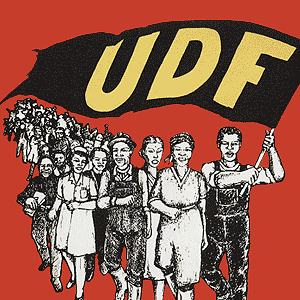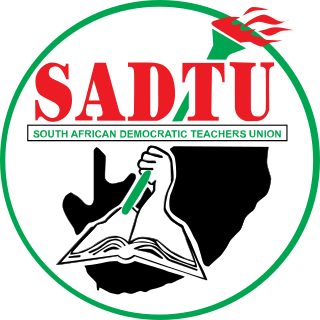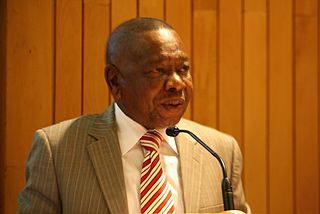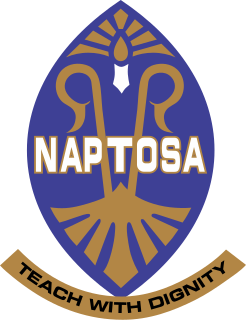Related Research Articles
Clement Martyn Doke was a South African linguist working mainly on African languages. Realizing that the grammatical structures of Bantu languages are quite different from those of European languages, he was one of the first African linguists of his time to abandon the Euro-centric approach to language description for a more locally grounded one. A most prolific writer, he published a string of grammars, several dictionaries, comparative work, and a history of Bantu linguistics.

The University of the Witwatersrand, Johannesburg, is a multi-campus South African public research university situated in the northern areas of central Johannesburg. It is more commonly known as Wits University or Wits. The university has its roots in the mining industry, as do Johannesburg and the Witwatersrand in general. Founded in 1896 as the South African School of Mines in Kimberley, it is the third oldest South African university in continuous operation.

Es'kia Mphahlele was a South African writer, educationist, artist and activist celebrated as the Father of African Humanism and one of the founding figures of modern African literature.
The following lists events that happened during 1910 in South Africa.

The United Democratic Front (UDF) linked hundreds of popular organisations together in the struggle against apartheid. The non-racial coalition of about 400 civic, church, students', workers' and other organisations was formed in 1983, initially to fight the new Tricameral Parliament. The UDF's goal was to establish a "non-racial, united South Africa in which segregation is abolished and in which society is freed from institutional and systematic racism." Its slogan was "UDF Unites, Apartheid Divides."

The South African Democratic Teachers Union (SADTU) is the largest trade union for teachers in South Africa. It is allied to the African National Congress and is an affiliate of the Congress of South African Trade Unions (COSATU).
Nnoseng Ellen Kate Kuzwayo was a women's rights activist and politician in South Africa, and was a teacher from 1938 to 1952. She was president of the African National Congress Youth League in the 1960s. In 1994 she was elected to the first post-apartheid South African Parliament. Her autobiography, Call Me Woman (1985), won the CNA Literary Award.
Vincent Vesele Tshabalala was a South African professional golfer. He won a number of tournaments organised by the non-white Tournament Players Association and in 1976 he won the French Open.
The National Union of South African Students (NUSAS) was an important force for liberalism and later radicalism in South African student anti-apartheid politics. Its mottos included non-racialism and non-sexism.
The system of racial segregation in South Africa known as apartheid was implemented and enforced by many acts and other laws. This legislation served to institutionalise racial discrimination and the dominance by white people over people of other races. While the bulk of this legislation was enacted after the election of the National Party government in 1948, it was preceded by discriminatory legislation enacted under earlier British and Afrikaner governments. Apartheid is distinguished from segregation in other countries by the systematic way in which it was formalised in law.

Bonginkosi Emmanuel "Blade" Nzimande is a South African politician, sociologist, philosopher, educator, anti-apartheid activist and Minister of Higher Education, Science and Technology. He was Minister of Transport from 2018 to 2019, and Minister for Higher Education and Training from 2009 to 2017. He has been the General Secretary of the South African Communist Party since 1998.

Internal resistance to apartheid in South Africa originated from several independent sectors of South African society and took forms ranging from social movements and passive resistance to guerrilla warfare. Mass action against the ruling National Party (NP) government, coupled with South Africa's growing international isolation and economic sanctions, were instrumental in leading to negotiations to end apartheid, which began formally in 1990 and ended with South Africa's first multiracial elections under a universal franchise in 1994.

The National Professional Teachers' Organisation of South Africa (NAPTOSA) is a professional organisation of teachers in South Africa. It is headquartered in Pretoria, South Afria.
The South African African Rugby Board was the body that governed black African South African rugby union players during the apartheid era, and one of three segregated rugby unions operating during that time. The representative team of the African Rugby Board was known as the Leopards.
Ashby Solomzi Peter Mda, also known as A. P. Mda was a South African teacher, lawyer, political activist and co founder of the African National Congress Youth League (ANCYL). He was also one of the founders of the Pan Africanist Congress of Azania.
The African Teachers' Association of South Africa (ATASA) was a trade union representing black teachers in South Africa.
The National Union of Educators (NUE) was a trade union representing education workers in South Africa.
The South African Teachers' Association (SATA) was a trade union representing white teachers in the Cape Province of South Africa.
The Suid-Afrikaanse Onderwysers Unie (SAOU), sometimes translated as the South African Teachers' Union, is a trade union representing principally Afrikaans-speaking teachers in South Africa.
References
- ↑ Jeannerat, Caroline; Morier-Genoud, Éric; Péclard, Didier (2011). Embroiled: Swiss Churches, South Africa and Apartheid. LIT Verlag Münster. ISBN 3825897966.
- ↑ "Dr. Es'kia Mphahlele", SA History Online.
- ↑ Hyslop, Jonathan (1989). A Destruction Coming In: Bantu Education as Response to Social Crisis (PDF). Johannesburg: University of Witwatersrand. Retrieved 27 April 2021.
- ↑ "THE PROFESSIONAL EDUCATORS 'UNION BIDS FAREWELL TO MRS ML TSHABALALA". Professional Educators' Union. Retrieved 27 April 2021.
- ↑ Vilardo, Philip. "Contemporary conflict in black teachers politics: The role of the Africanization of the Apartheid education structure, 1940-1992". WIReD Space. University of the Witwatersrand. Retrieved 27 April 2021.
- 1 2 Zengele, Vincent Thulani (2009). THE INVOLVEMENT OF TEACHER UNIONS IN THE IMPLEMENTATION OF THE EMPLOYMENT OF EDUCATORS’ ACT 76 OF 1998 (PDF). Pretoria: University of South Africa. Retrieved 27 April 2021.
- ↑ Lawrence, Andrew (2014). Employer and Worker Collective Action. Cambridge: Cambridge University Press. ISBN 1107071755.